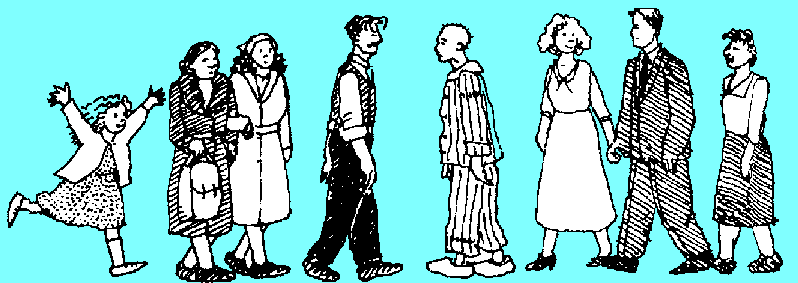Anna Baum
The Unexpected Matzo
From "Procession: Stories from a Polish Past"
 |
Copyright by Anna Baum
|
The Germans, though with considerable difficulty, were still pushing into the Russian hinterland, annihilating everything in their path. As if the cold was not enough, the food rations were unbearably meager and of the poorest quality. There were no trains to bring anything in. Everything was needed for the front, which was understandable enough, but then how was one to survive? We relied on potatoes, which were our main food staple, but after that rainy summer, not much was left, and the potatoes turned black very quickly. Every day Mother boiled a few of them and prayed that they would last a bit longer. For a while we had a substantial supply of dried and pickled mushrooms which Mother had picked in the fall in the taiga. Cooked with a few potatoes, they made a nourishing meal. But now our stock was diminishing at a frightening speed, and the future seemed grim, almost hopeless. Mother desperately tried to get some flour instead of a bread ration, or exchange some pieces of clothing we still possessed for a cup of cereal or flour, but neither was possible. Those luxuries could only be obtained on the black market, where the going currency was alcohol or bread. One evening, after school, I had to go back to the office to complete some urgent work. I worked through the night and returned home around nine o'clock the next morning, tired and worn out. Mother, as usual, was busy. I hastily swallowed my potatoes and fell asleep instantly. As if in a dream, I heard a muffled knock at the door, and then somebody coming in. Half asleep, I made out some strange whisperings. I tried to wake up. But suddenly, some half-forgotten words shook me out of my torpor. I woke with a start, in the belief that something of importance was happening, and that I should not miss it. Sitting at the table were two young women. They were simply though decently dressed, and spoke Yiddish: a soft, melodious Yiddish which I had not heard for a very long time; Not in this part of the world, anyway. At first I could not make out anything, but gradually everything fell into place. Our guests were two Chassidic women from the vicinity of Ekaterinburg. Their grandparents and parents had been resettled at the end of the last century by the Czar, and, since then, had lived, worked, and practised their religion there. The Chassidic community was, and always had been, a closed one, but counted among its members many highly educated people working in very specialised fields, including the government. They had undergone much suffering during the Civil War. But always, they kept mostly to themselves. Because they were so far removed from any large centre, not many outsiders knew about them, and thus they quietly managed to survive so far, and, God willing, they would continue to do so in the future. I heard the women say that members of their community were aware that there were some Jewish families scattered throughout this vast province, and that the community would like to let them know that they were not forgotten. They were used to coping with food shortages. Since the outbreak of war, food supplies had been more limited than ever, and that year was a particularly bad one, and they could store up only a minimum of grain and flour. Soon it would be Pesach and they had nevertheless managed, as usual, to bake some matzot, and wanted to share it with the less fortunate. They asked to be forgiven for having brought so little: they had traveled more than five hundred miles by train, and had done their best. Everything had to be hidden and be done in secret. One of the women opened her canvas bag and took out a small package of round matzo sewn up in grayish linen: the other took out from her muff a little bag, also sewn up in linen, containing matzo meal. Mother was searching for words appropriate for the occasion, but the women would not accept any thanks. Finally, Mother offered some tea, murmuring quietly that she only had "kipiatok," boiling water, but no tea and no sugar. "We know," the women answered, "and you should not be ashamed of it." Asked how they had known about us, they smiled radiantly. "We know about a lot of people, but have to be careful. We visit only one family at a time, and carry only one single package. The name and address? They are in our heads." We helped them with their coats and embraced three times, Russian style. "May I know your names?" Mother asked. "Malka and Esphira," said one after the other. "And may you have a healthy and happy Pesach."
|